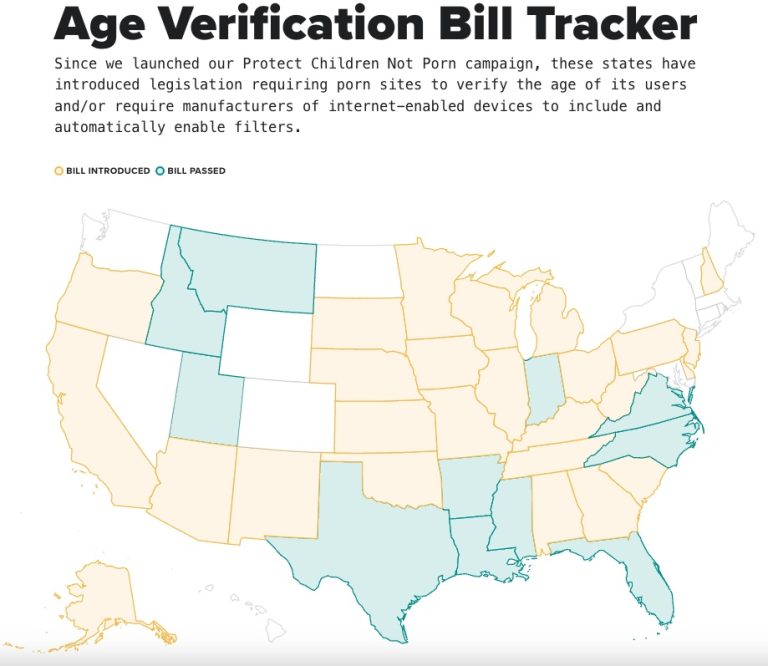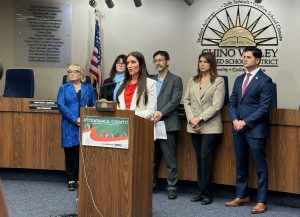The state legislature is considering whether to make California the 12th state in the Union to require pornography websites to keep minors from seeing their content by taking “reasonable steps” to verify users are adults. The bill, AB 3080, authored by Assemblyman Juan Alanis (R-Modesto) faces its first test on Tuesday of next week in a hearing before the Assembly’s Privacy and Consumer Protection Committee.
According to Alanis’s bill fact sheet, California’s existing laws don’t require adult websites to verify the age of a majority of their users. As a result, children are exposed to obscene, indecent, and damaging content all the time. In 2022, Common Sense performed a survey of 1,300 minors regarding their consumption of pornography. Most children gain access to pornography at the age that they receive their smartphones. 58% of the children reported accidental exposure to pornography. Among those who intentionally consumed pornography, 71% did so within the week of the survey. Alarmingly, 15% first encountered pornography at age 10 or younger.
“Some studies have even shown correlations between the rise of consumption of porn and the increase in sex trafficking, child pornography, and sexual abuse,” Alanis’s fact sheet stated. “California has long been on the forefront of legislation that aims to protect children from abuse and exploitation, yet, not restricting access to pornographic content leaves California minors at risk of psychological damage that could last a lifetime.”
Assembly Bill 3080 (AB 3080) will require websites that host pornographic content, to employ the use of age verification software to prevent minors from accessing obscene and indecent material online. In addition, this bill will prohibit the companies who perform these age verification requirements from retaining personal information of users.
Organizations around the country have pushed age-verification laws in state legislatures in response to the flood of pornography impacting minors. One of those is an anti-sex trafficking organization, Exodus Cry, which produced several documentaries regarding the harms of pornography and its links to sex trafficking. Its “Protect Children Not Porn” website features “Raised on Porn: The New Sex Ed,” a documentary that exposes the ways pornography has become the new sex education for children and unpacks the dangerous lifelong implications of this global phenomenon.
“We have received thousands of messages and stories from people sharing that underage exposure to pornography negatively impacted their life,” wrote Helen Taylor, Exodus Cry’s Vice President of Impact, in a letter supporting SB 3080. “Early porn exposure is tied to anxiety, violence, self-loathing, body dysphoria, addiction, and sexual function issues. It is also linked to an increased likelihood of committing sexual assault and rape.”
Another organization advocating around the country for Age Verification laws is the California Family Council partner organization the Family Policy Alliance (FPA). Joseph Kohm, FPA’s Director of Public Policy, has been flying around the country testifying for these proposals in state legislatures; he will be testifying on behalf of AB 3080 as well.
“Studies show that 53% of male adolescents and 39% of female adolescents actually believe the lie that pornography is an accurate portrayal of sex. Thus, adolescents are learning about sexuality from a perspective which portrays sex as physical abuse, instead of receiving age-appropriate sex education from a parent or guardian.” Kohm wrote in his AB 3080 support letter. “The age verification requirements in AB 3080 are necessary to prevent minors from encountering inappropriate and pornographic material and to empower parents to protect their kids from such exposure.”
Similar age verification bills have already passed in 11 states and been introduced in 24 others, but opposition groups have filed lawsuits. For instance, the Free Speech Coalition sued over Texas’s Age Verification law, but was defeated last month in the U.S. Court of Appeals for the Fifth Circuit. Its ruling stated, “Applying rational-basis review, the age-verification requirement is rationally related to the government’s legitimate interest in preventing minors’ access to pornography…. Therefore, the age-verification requirement does not violate the First Amendment.”
“Just like retail and restaurant establishments are required to make a reasonable effort to verify the age of customers buying alcohol to prevent the negative effects on minors, websites with obscene and indecent material harmful to minors should be required to conduct age verification as well,” Greg Burt, Vice President of the California Family Council, said.
For more information about Age Verification laws read:











